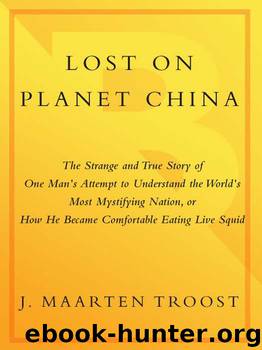Lost on Planet China: The Strange and True Story of One Man's Attempt to Understand the World's Most Mystifying Nation or How He Became Comfortable Eating Live Squid by Troost J. Maarten

Author:Troost, J. Maarten [Troost, J. Maarten]
Language: eng
Format: mobi
Publisher: Broadway
Published: 2008-07-07T16:00:00+00:00
There are typhoons and there are super typhoons. Typhoon Chancu was only the second super typhoon to ever be recorded in the South China Sea. And somehow, I had managed to place myself on an island while it struck. Clearly, I really needed to learn how to read a Chinese newspaper. This was inconvenient, a small problem, as I had to be in Hong Kong shortly to meet a friend. But instead of leisurely making my way south through Zhejiang, Fujian, and Guangdong Provinces, I found myself marooned on an island while thunderous waves broke on its shore and gale-force winds buffeted the trees.
But this was my fault too. China is a big country, and you don’t quite realize how big it is until you start plotting the time and logistics it takes to get oneself from here to there. Nothing is straightforward in China; there are always complications. And it is enormous, this country of 1.3 billion people. What I usually assumed would be a three-hour journey was invariably a ten-hour one. And so I found myself stuck on an island approximately halfway from my intended destination. And there was a typhoon.
Perhaps it was just one of those things. Typhoons happen. Even super typhoons, though not very often. Perhaps it was some deity in the sky who saw that this guy who had lived on islands was on an island again and so why not send in a typhoon. But I knew that was not the case. I am dust in the wind from a deitological perspective. I come from a Catholic tradition, and that God ain’t personal.
More likely, this super typhoon was a harbinger of climate change. No single weather event, of course, is indicative of anything. Shit happens. Just because. But it’s difficult to spend a moment in China and not be utterly awed by the scale of the ongoing environmental catastrophe. Today, there is one vehicle for every forty inhabitants in China. In the U.S., it’s one vehicle per 1.25 inhabitants, so you can see where China is trending. Chinese oil companies are traveling to the ends of the earth to secure their oil supply: Sudan, Angola, Papua New Guinea. They even tried to buy Unocal, the eighth-largest American oil and gas production company. Together with India, there are now 2.5 billion people in the global economy that just weren’t there fifteen years ago. The consequences for the environment are alarming. The U.S. has 5 percent of the world’s population and emits 25 percent of the world’s pollution. So what happens when the Chinese, and one out of every five people on this planet lives in China, start to live like us? Sure, they deserve it. Everyone should have the right to have a car, to have heating and air-conditioning, to have a job in an office or factory. But from an environmental perspective, this is a terrifying development.
And meanwhile China rumbles in discontent. There are thousands of protests. In 2005, there were 87,000 official, government-recognized “mass incidents” among the laobaixing, or common people.
Download
This site does not store any files on its server. We only index and link to content provided by other sites. Please contact the content providers to delete copyright contents if any and email us, we'll remove relevant links or contents immediately.
China Rich Girlfriend by Kwan Kevin(3900)
The Silk Roads by Peter Frankopan(3769)
Annapurna by Maurice Herzog(2845)
Hot Thai Kitchen by Pailin Chongchitnant(2815)
Full Circle by Michael Palin(2780)
Okonomiyaki: Japanese Comfort Food by Saito Yoshio(2391)
City of Djinns: a year in Delhi by William Dalrymple(2138)
The Ogre by Doug Scott(2118)
Photographic Guide to the Birds of Indonesia by Strange Morten;(2091)
Tokyo by Rob Goss(2021)
Vietnam, Cambodia, Laos & Northern Thailand by Lonely Planet(2015)
Tokyo Geek's Guide: Manga, Anime, Gaming, Cosplay, Toys, Idols & More - The Ultimate Guide to Japan's Otaku Culture by Simone Gianni(1949)
Discover China Travel Guide by Lonely Planet(1867)
Everest the Cruel Way by Joe Tasker(1828)
China (Lonely Planet, 11th Edition)(1799)
Lonely Planet China(1758)
China Travel Guide by Lonely Planet(1741)
Top 10 Dubai and Abu Dhabi by DK Travel(1718)
Iranian Rappers And Persian Porn by Maslin Jamie(1712)
